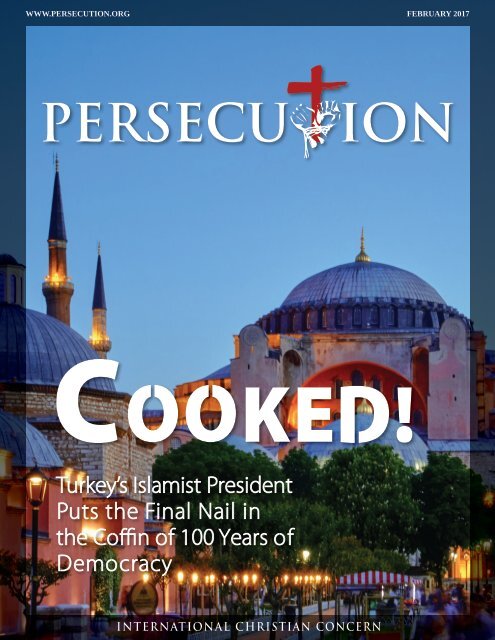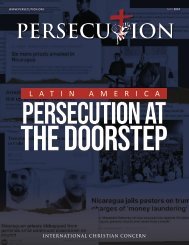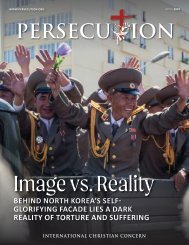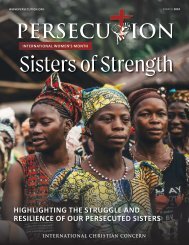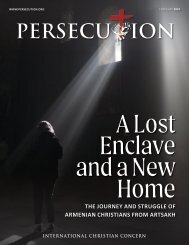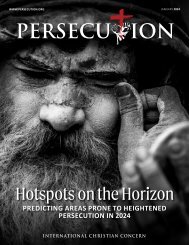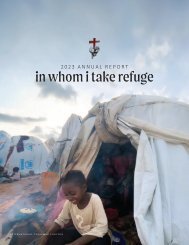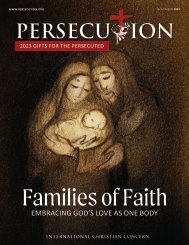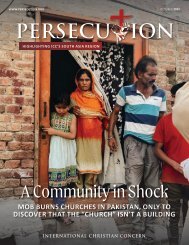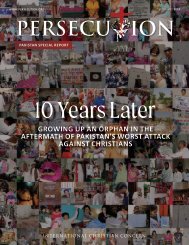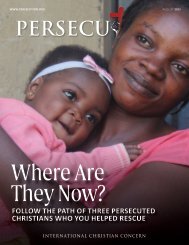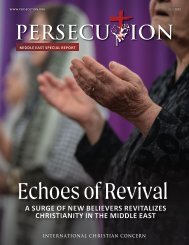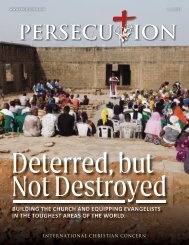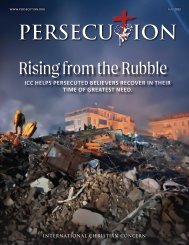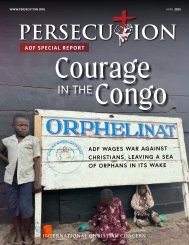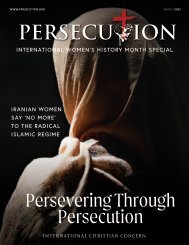You also want an ePaper? Increase the reach of your titles
YUMPU automatically turns print PDFs into web optimized ePapers that Google loves.
WWW.PERSECUTION.ORG<br />
FEBRUARY <strong>2017</strong><br />
PERSECU ION<br />
COOKED!<br />
Turkey’s Islamist President<br />
Puts the Final Nail in<br />
the Coffin of 100 Years of<br />
Democracy<br />
PERSECU ION.org<br />
INTERNATIONAL CHRISTIAN CONCERN
Table of Contents<br />
In This Issue:<br />
ICC EXCLUSIVE<br />
14 | An Uncertain Future for<br />
Iraq’s Christians<br />
As ISIS is pushed back by coalition<br />
forces, many Christians are looking towards<br />
a complex and uncertain future.<br />
FEATURE<br />
20 | The Fulani Plague<br />
The view of Fulani attacks is shifting<br />
from disputes between neighbors to one<br />
of jihad and religious targeting.<br />
FEATURE<br />
24 | From Mourning to Joy: Chibok<br />
Girls Restored to Their Families<br />
After more than two years of agonizing<br />
uncertainty, the families of 21 of the<br />
kidnapped Chibok girls were reunited.<br />
FEATURE<br />
26 | The Perfect Excuse: Coup<br />
Attempt in Turkey<br />
Since the July 15, 2016 attempted coup,<br />
unease and confusion rule and many<br />
see little hope for their country in the<br />
near future.<br />
16<br />
LETTER<br />
30 | A Letter to the President<br />
A letter from a persecuted Christian in<br />
Egypt to President Trump.<br />
Regular Features<br />
3 Letter from the President<br />
A few words from ICC’s president, Jeff<br />
King, on Turkey - its location, its history,<br />
and its current leader.<br />
4 World News<br />
A snapshot of the persecution that<br />
impacts our brothers and sisters daily, in<br />
every corner of the world.<br />
8 Your Dollars at Work<br />
Learn how your gifts are providing<br />
comfort, relief, Bibles, education and<br />
vocational training to the persecuted.<br />
12 Impact Report<br />
See this quarter’s statistics of how<br />
ICC’s funds are helping the persecuted<br />
across the globe.<br />
22<br />
26<br />
25<br />
31<br />
2 PERSECU ION.org<br />
FEBRUARY <strong>2017</strong><br />
INTERNATIONAL CHRISTIAN CONCERN
President’s Letter<br />
“‘The mosques are our barracks, the domes our helmets, the minarets our<br />
bayonets and the faithful our soldiers...’”<br />
- Turkey’s President and Chief Islamist, Recep Erdogan, reciting a poem<br />
Turkey is an incredibly important country in terms of geopolitics and religion.<br />
It has stood as a buffer between Europe and radical Islamist regimes and populaces<br />
in the Middle East. It is also the land bridge between Europe and Asia, and<br />
has been a secular democracy and important ally to the West since the 1920s.<br />
Jeff King, President<br />
International Christian Concern<br />
At the turn of the century though, the populace elected Recep Erdogan as president, largely as a protest against the longstanding<br />
secular and corrupt ruling party.<br />
Pretending to be a moderate, he has since been revealed to be a radical Islamist and despot who has systematically destroyed<br />
all opposition to his rule and has established himself as an all-powerful, Islamist, semi-dictator.<br />
The Christians and moderate Muslims of Turkey are very fearful of the future, and should be, as Erdogan is quite dangerous<br />
and has shown his desire to rule as dictator.<br />
The Church in Turkey is sure to suffer more and we must be ready to serve them.<br />
So please join with us as we bandage and build His persecuted Church around the world. As always, your donations will be<br />
used efficiently, effectively, and ethically.<br />
I promise!<br />
Jeff King<br />
President<br />
International Christian Concern<br />
www.persecution.org<br />
PERSECU ION.org<br />
INTERNATIONAL CHRISTIAN CONCERN<br />
3
News<br />
Eighteen Killed in Al-Shabaab Attack<br />
1 | KENYA In the month of October 2016, the Islamic<br />
terror group al-Shabaab was responsible for killing 18<br />
Christians in the town of Mandera, Kenya. On October<br />
6, six people were murdered when al-Shabaab militants<br />
attacked a residential building. Several more were<br />
wounded. During this attack, the police chief noted<br />
that the al-Shabaab militants were also singling out<br />
non-locals. Thankfully, he also reported that police<br />
intervention prevented further violence and led to the<br />
rescue of 27 others who may have otherwise been<br />
injured or killed.<br />
Later, on October 25, al-Shabaab carried out another<br />
attack on a hotel, killing an additional 12 Christians.<br />
The attackers stormed the front gate with explosives<br />
to gain entry, before fatally shooting residents in their<br />
rooms. These people were all needlessly murdered in<br />
the night simply because of their faith. Shortly after<br />
the attack took place, al-Shabaab claimed responsibility<br />
for the attack.<br />
4<br />
3<br />
1<br />
2<br />
5<br />
6<br />
Eighteen families<br />
and countless loved<br />
ones are now grieving<br />
the loss of their family<br />
members due to these<br />
brutal acts of violence.<br />
Al-Shabaab has justified<br />
violence against<br />
Mandera’s Christian<br />
community by saying<br />
that the attacks are a<br />
response to the Kenyan<br />
military’s presence in<br />
Somalia. Yet, these<br />
attacks and many others<br />
specifically target<br />
Christians, proving<br />
that there is also religious<br />
motivation.<br />
While some parts<br />
of Kenya maintain<br />
relative peace among<br />
differing religious<br />
communities, the border<br />
between Somalia<br />
and Kenya, where<br />
Mandera is located,<br />
is a regular hotspot<br />
for violence against<br />
Christians. Unless the<br />
international Christian<br />
community pays<br />
greater attention to<br />
the senseless violence<br />
taking place in eastern<br />
Africa, Christians in<br />
Mandera will continue<br />
to risk their lives simply<br />
for placing their<br />
faith in Jesus.<br />
He has been<br />
the target of<br />
imprisonment<br />
largely because<br />
of his activity in<br />
the community of<br />
house churches<br />
in Iran.<br />
Iranian Pastor Released from Prison<br />
2 | IRAN Iranian pastor Behnam Irani, 43, was released<br />
from prison on October 18, 2016, after serving almost<br />
six years in prison. Irani was initially arrested and<br />
given a one-year sentence in 2011 based on charges<br />
related to his Christian faith, in the name of “national<br />
security.” He was later told that he would have to serve<br />
an additional five years for a sentence that was previously<br />
suspended.<br />
This is not the first time that Irani was imprisoned.<br />
He was previously arrested in 2006 on similar<br />
charges, but was released only one month later.<br />
He has been the target of imprisonment largely<br />
because of his activity in the community of house<br />
churches in Iran. Even after his arrest in 2006, he<br />
returned to his position<br />
as the pastor of<br />
a 300-member house<br />
church.<br />
At the time of his<br />
release, Irani said<br />
that the conditions<br />
in prison led to various<br />
medical issues,<br />
but he found encouragement<br />
through his<br />
faith. Despite government<br />
pressure to convert,<br />
the pastor stated<br />
that he held fast to<br />
his faith during his<br />
imprisonment.<br />
4 PERSECU ION.org<br />
FEBRUARY <strong>2017</strong><br />
INTERNATIONAL CHRISTIAN CONCERN
Anniversary of the Murder of the 21 Martyrs<br />
3 | LIBYA On <strong>February</strong> 15, <strong>2017</strong>, the world is recognizing one of the most heinous acts of violence on the Christian community in recent history:<br />
the beheading of 21 Coptic Christians in Libya. Two years ago, ISIS released a report showing the photos of the kidnapped Christians. Just days<br />
later, a five-minute video was issued, depicting the beheading of the captives. We consider it the utmost privilege to honor the legacy that these<br />
men have left behind, while praising the Name of Jesus in their final moments.<br />
Pastor and Eight Others Killed by Boko Haram<br />
4 | NIGERIA On October 29, 2016, two attacks led by female suicide<br />
bombers left a Christian pastor and eight other individuals dead in<br />
Maiduguri, Nigeria. It is believed that the women responsible for<br />
the bombings were affiliated with the militant Islamic group Boko<br />
Haram. After declaring their commitment to specifically targeting<br />
Christians, particularly in Nigeria, Boko Haram’s attacks have ravaged<br />
countless Christian communities in West Africa, leaving many<br />
without loved ones or a place to call home.<br />
Christians in Kazakhstan Fined<br />
5 | KAZAKHSTAN Two Christians from the Council of Baptists in<br />
Kazakhstan were issued fines after distributing New Testaments and<br />
other uncensored religious materials to the public. Kazakhstan and<br />
many other countries in Central Asia severely censor religious materials,<br />
often with harsh punishment for violating such censorship restrictions.<br />
For those who refuse to pay fines for refusing to comply with<br />
these policies, punishments can vary from bans on leaving the country<br />
to jail sentences.<br />
House Church Shut Down in China<br />
6 | CHINA Yet another house church has been closed down as part of China’s<br />
ongoing campaign called “Three Rectifications and One Demolition.” The church<br />
was located in the Zhejiang province which has been a major target for government<br />
persecution, due largely in part to its significant Christian population.<br />
Christians and human rights advocates throughout China have found themselves<br />
as victims of imprisonment, church demolitions, and occasionally violence.<br />
The owners of the building were contacted by government officials who<br />
told them that they must cease religious activities due to the fact that religious<br />
activities were taking place in an unregistered building. Despite the ongoing<br />
government crackdown on Christianity, the Church continues to grow. In fact,<br />
the Church is growing so rapidly that experts estimate that China will be home<br />
to the largest Christian population in the world by the year 2030.<br />
PERSECU ION.org<br />
INTERNATIONAL CHRISTIAN CONCERN<br />
5
News<br />
3<br />
5<br />
1 2<br />
6<br />
4<br />
Several armed<br />
men stormed<br />
American<br />
missionary<br />
Woodke’s home.<br />
Cairo University Takes Steps to End<br />
Religious Discrimination<br />
1 | EGYPT On October 11, 2016, Gaber Nassar, president<br />
of Egypt’s Cairo University, implemented a major policy<br />
change in order to reduce religious discrimination on<br />
campus. According to the new policies, the school will no<br />
longer require students or faculty to identify their religious<br />
affiliation on university paperwork.<br />
Among other factors, this decision was enacted after<br />
several Christian students came forward claiming that<br />
they were rejected from the school’s Institute of African<br />
Research and Studies program earlier in the year. At least<br />
one student alleged that his application was rejected after<br />
identifying himself as a Christian; the department would<br />
not provide him with a valid reason for his denial from<br />
the program.<br />
While ICC and other human rights groups view this<br />
decision as a clear step in the right direction, some do not<br />
feel similarly. Member of Parliament Atef Makhalif spoke<br />
out strongly against the decision and called for Nassar’s<br />
resignation over the matter. Others, while also in support<br />
of the decision, are hesitant to believe that discrimination<br />
will truly decrease as a result of this policy.<br />
Although it is too soon to predict how effective this<br />
policy will be in protecting religious minorities in<br />
Egypt’s education system, this is an encouraging development<br />
led by a body with a significant amount of influence<br />
in the region.<br />
Muslims and<br />
Christians<br />
Unite<br />
2 | PAKISTAN In an<br />
encouraging step<br />
forward for religious<br />
freedom, Christians<br />
and Muslims in<br />
Pakistan united to<br />
protect a nine-yearold<br />
boy from blasphemy<br />
charges. The<br />
boy and his mother<br />
were taken into custody<br />
by police after<br />
being accused of<br />
allegedly burning<br />
pages of the Quran.<br />
Upon their imprisonment,<br />
protests broke<br />
out among leaders in<br />
both Christian and<br />
Muslim communities.<br />
In response to the<br />
protests and the work<br />
of multiple activists,<br />
the charges were<br />
dropped. Although<br />
this response from<br />
the community is<br />
cause for celebration,<br />
we must be sure<br />
not to ignore the fact<br />
that the government<br />
has begun targeting<br />
minors under blasphemy<br />
laws that<br />
could potentially<br />
lead to the death<br />
penalty.<br />
American Missionary Kidnapped in<br />
Niger<br />
3 | NIGER American missionary Jeff Woodke was<br />
abducted in mid-October while serving in northern<br />
Niger. Woodke was working with a branch of the<br />
ministry organization called Youth With a Mission<br />
(YWAM) at the time of his kidnapping. According<br />
to local authorities, Woodke had been serving the<br />
region for 24 years. His ministry activities were<br />
largely based in community development as he<br />
helped provide better access to education, agricultural<br />
assistance, healthcare and clean water.<br />
It is believed that the kidnappers belong to the<br />
radical Muslim group MUJAO, translated in French<br />
as the acronym for “Movement for Oneness and<br />
Jihad in West Africa.” This group formally entered<br />
the world stage in 2011 after breaking off of the<br />
more widely recognized al-Qaeda in the Islamic<br />
Maghreb (AQIM).<br />
Reports indicate that several armed men stormed<br />
Woodke’s home in the evening, forcibly capturing<br />
him, before fleeing the country with him. Many<br />
suggest that the group took him toward Mali. The<br />
attack has left the local missionary community filled<br />
with both worry and uncertainty. Local ministries<br />
are operating with caution as this is allegedly the<br />
first incident where a Christian missionary has been<br />
kidnapped in the area.<br />
6 PERSECU ION.org<br />
FEBRUARY <strong>2017</strong><br />
INTERNATIONAL CHRISTIAN CONCERN
Indonesian police investigate<br />
the church attack that lead to<br />
the death of a two-year-old.<br />
AFP Photo.<br />
Toddler Killed in Church Attack<br />
4 | INDONESIA On November 13, 2016, a church in Samarinda,<br />
Indonesia, was attacked by Muslim radicals believed to be affiliated<br />
with ISIS. During the attack, the perpetrator threw a Molotov cocktail<br />
into a parking lot of children playing, leading to the death of a twoyear-old<br />
Christian girl who sustained burns to three-quarters of her<br />
body. Four other children were hospitalized. The suspect attempted to<br />
flee by jumping into a river, but was apprehended by a group of locals<br />
shortly after and taken to the police station.<br />
Daughter Denied the Burial of Her Mother<br />
5 | KYRGYZSTAN After losing her 76-year-old mother, Jyldyz<br />
Azaeva and her family did not think that their Christian faith would<br />
make the grieving process much more painful. This family in<br />
Kyrgyzstan was forced to bury and exhume their mother three times<br />
over disputes on where she could be buried on account of her faith.<br />
As a Baptist, both the Russian Orthodox and Muslim communities<br />
made the burial process a nightmare until their mother was finally<br />
laid to rest in an undisclosed location.<br />
Christian Family Beaten by Hindu Radicals<br />
6 | INDIA In a brutal attack led by suspected Hindu radicals, a Christian family<br />
was beaten in India after their home was invaded. The attackers stormed into the<br />
home of Sularam Kashyap, his pregnant wife, and his elderly parents, sparing<br />
none of the family members. All four were hospitalized due to the severe beatings.<br />
During their time in the hospital, an aid worker visited the family in order to<br />
obtain their testimony. According to reports, this visit angered the police who<br />
then forced the family to leave the hospital prematurely. Unfortunately, due to<br />
the severity of his condition and being denied adequate care, Sularam’s father<br />
died approximately two weeks after being forced out of the hospital.<br />
Furthermore, due to a social boycott against Christians in his village,<br />
Sularam was initially denied the right to bury his father in the village cemetery<br />
and was only granted access following police intervention.<br />
PERSECU ION.org<br />
INTERNATIONAL CHRISTIAN CONCERN<br />
7
Your Dollar$ at Work<br />
Hope House<br />
Egypt<br />
Community Rebuild<br />
In November 2016, ICC celebrated the opening<br />
of its first Hope House in Egypt. For<br />
more than two decades, ICC’s mission to the<br />
persecuted has mainly focused on relief, seeking<br />
to bandage the wounds caused by persecution.<br />
Although this relief mission was successful,<br />
it did not address some of the systemic<br />
challenges faced by persecuted Christians<br />
around the world.<br />
To begin solving some of these systemic<br />
challenges, ICC developed a new program<br />
in 2016 called the Hope House. Through this<br />
Hope House program, ICC plans to establish<br />
a holistic center within countries and communities<br />
particularly affected by persecution.<br />
Through these centers, ICC will be able to<br />
provide persecuted Christians with a better<br />
education, micro-finance opportunities,<br />
vocational training, spiritual discipleship, and<br />
holistic community transformation.<br />
After months of fundraising, and thanks<br />
in large part to a generous partner church,<br />
ICC was able to launch its first Hope House<br />
in Egypt in November 2016. To start, Hope<br />
House Egypt will be serving primarily on<br />
three fronts. First, an education center has been<br />
established and renovated, where Christian<br />
children will receive tutoring and have access<br />
to English and computer classes that will make<br />
them more competitive in Egypt’s job market.<br />
To date, Hope House Egypt is already providing<br />
educational support to more than 100<br />
Christian children.<br />
Second, Hope House Egypt seeks to provide<br />
vocational training to Christian individuals<br />
seeking to improve their careers. Thus far,<br />
Hope House Egypt has surveyed the Christian<br />
communities and is preparing a relevant vocational<br />
training program.<br />
Finally, Hope House Egypt has already<br />
started providing access to micro-finance<br />
loans for Christians with quality business<br />
ideas. Hope House Egypt has been able to<br />
provide five micro-finance loans to Christians<br />
in the community it serves thus far.<br />
As ICC continues to support the Hope<br />
House Egypt program, please remember to<br />
keep it in your hearts and prayers.<br />
8 PERSECU ION.org<br />
FEBRUARY <strong>2017</strong><br />
INTERNATIONAL CHRISTIAN CONCERN
Supporting<br />
Somali Pastors<br />
Underground Pastors<br />
As Somalia is a safe haven for Islamic<br />
radicals, such as the militant group al-<br />
Shabaab, openly practicing Christianity in<br />
Somalia is a death sentence. It has been among<br />
one of the worst countries for Christian persecution<br />
for decades. Churches are forced to<br />
operate underground for fear of being captured<br />
and punished.<br />
Given these circumstances, it is more<br />
important than ever to continue to provide<br />
financially for those who risk their lives<br />
every day to share the Gospel. ICC provides<br />
monthly support to several underground pastors<br />
in Somalia. This financial assistance<br />
allows each underground pastor to continue<br />
to preach the Gospel and provide for their<br />
congregations.<br />
The generosity of donors makes it possible<br />
for these pastors to continue the work of the<br />
Great Commission in one of the most closed<br />
nations in the world.<br />
PERSECU ION.org<br />
INTERNATIONAL CHRISTIAN CONCERN<br />
All Saints Church<br />
Anniversary<br />
Suffering Wives & Children<br />
In September 2013, two suicide bombers<br />
attacked All Saints Church in Peshawar,<br />
Pakistan. More than 600 worshipers were<br />
present at the church at the time of the<br />
explosion. When the dust settled, 130<br />
Christians were dead and many more were<br />
seriously injured. Since April 2014, ICC<br />
has assisted the victims of the attack by<br />
providing schooling, medical aid, food, and<br />
psychological healing.<br />
This past September marked the three-year<br />
anniversary of the deadly bombing at All<br />
Saints Church. The survivors and families of<br />
those killed reached out to ICC to help cover<br />
the costs of a memorial service to honor the<br />
martyrs who were killed in the attack. ICC<br />
covered the expenses of the memorial service,<br />
as well as providing food aid, in hopes<br />
of continuing the emotional and psychological<br />
healing for this Christian community<br />
affected by such a tragic loss.<br />
Aid to Family<br />
Devastated by<br />
Al-Shabaab<br />
Suffering Wives & Children<br />
E<br />
vans Araka was one of six Christians who<br />
were killed when al-Shabaab attacked<br />
his residential building in Mandera, Kenya,<br />
on October 6, 2016. He suffered several<br />
shots to the stomach and shrapnel injuries<br />
from exploding grenades that were hurled at<br />
the bedroom where he was sleeping.<br />
Araka left behind his wife and five children.<br />
As the main breadwinner of the family,<br />
his death left his family struggling for<br />
basic necessities. Having spent much of<br />
their valuable resources on funeral costs,<br />
the family was in dire need of assistance.<br />
ICC stepped in and provided enough food<br />
for a month as they mourned the loss of their<br />
loved one.<br />
“You are a miracle today,” said Araka’s<br />
wife, who expressed her deep gratitude to<br />
ICC and its donors.<br />
9
Your Dollar$ at Work<br />
Bibles to<br />
Churches in<br />
Zanzibar<br />
Bibles<br />
On the island of Zanzibar, where the vast<br />
majority of the population is Muslim, the<br />
need to share the Gospel is crucial. Thankfully,<br />
many former Muslims are turning to Christ due<br />
to the work of faithful Christian ministries in<br />
the region. However, financial difficulties and<br />
rural locations have made it difficult for many<br />
new Christians to obtain a Bible of their own.<br />
In early October, ICC provided several<br />
churches in Zanzibar with Bibles to assist them<br />
in their ministries. The six pastors and churches<br />
that ICC worked with have been facing continued<br />
persecution which has left them without<br />
the financial resources to effectively preach and<br />
distribute the Gospel in their communities.<br />
With the help of generous donors, ICC<br />
was able to provide a stockpile of Bibles<br />
to be split among the six pastors who will<br />
distribute them among new believers hungry<br />
for the Word of God. Please remember these<br />
pastors in your prayers as they reach out to<br />
new believers and communities that have yet<br />
to accept the Gospel.<br />
Car Wash Business<br />
for Displaced<br />
Family<br />
Community Rebuild<br />
ISIS attacks have displaced thousands of<br />
Christian families from their homes in Iraq.<br />
The number of Christians living in Iraq has<br />
decreased drastically, from one million in<br />
2003 to approximately 275,000 today.<br />
Simon (name changed for security) was once<br />
a typical 20-year-old college student studying<br />
engineering. However, as ISIS gained increasing<br />
control in Iraq, he and his family were<br />
forced to abandon their home in Qeraqosh.<br />
Shortly after the family’s displacement,<br />
Simon’s father fell ill, shifting some of the<br />
responsibility of providing for the family<br />
onto Simon. Therefore, Simon put his college<br />
career on hold in order to open a car<br />
wash business. ICC provided Simon with the<br />
necessary tools to open up this small business<br />
to support his family. With this business assistance,<br />
Simon and his family will be relieved<br />
of the financial burden they are facing and he<br />
will hopefully be able to return to college once<br />
his family is back on their feet.<br />
While reflecting on the recent changes in<br />
his life, Simon said, “We used to have [an]<br />
amusement park in Qeraqosh, half of it owned<br />
10 PERSECU ION.org<br />
FEBRUARY <strong>2017</strong><br />
INTERNATIONAL CHRISTIAN CONCERN
Your Dollar$ at Work<br />
Indian Pastor’s Hearing Restored<br />
Underground Pastors<br />
Last year, an Indian pastor was attacked by<br />
Hindu radicals on his way home from a<br />
service. Pastor Rao was dragged out of his<br />
bus and taken to a deserted area. The attackers<br />
recorded the ordeal during which Pastor Rao<br />
was severely beaten to scare other pastors and<br />
Christians. Although he survived, Pastor Rao<br />
sustained major injury and lost his hearing.<br />
Pastor Rao desperately needed surgery, but<br />
had to borrow the finances to pay for the operation.<br />
Upon learning of his situation, ICC paid<br />
his debt in October. Pastor Rao expressed his<br />
gratitude: “ICC’s help is such great relief, from<br />
the burden of such big loan that would take<br />
years for me to clear, having [a] rural ministry,<br />
and with limited income is almost impossible<br />
to pay back. I praise God for the healing on my<br />
ear, that I am able to continue the ministry.”<br />
by my father and he used to encourage us to<br />
study and he will take care of everything, I<br />
think the day has come [for] us to take care<br />
of him since he is having medical treatment.”<br />
It is ICC’s hope that this business will help<br />
Simon and his family return to a sense of<br />
normalcy, despite the abnormal obstacles that<br />
they are facing.<br />
Simon has also requested prayer for the health<br />
of his father. Medical issues are always difficult,<br />
without the added stress of forced relocation.<br />
Please keep this family in your prayers this year<br />
as they face new challenges, with the encouragement<br />
that their brothers and sisters in Christ<br />
around the world are supporting them.<br />
PERSECU ION.org<br />
INTERNATIONAL CHRISTIAN CONCERN<br />
Aiding & Encouraging Indonesian Church<br />
Where Most Needed<br />
Pastor N. (name changed for security) and<br />
his congregation in Aceh, Indonesia,<br />
are forced to hold services in a tent<br />
because their church has been destroyed.<br />
There is no electricity or shelter from<br />
mosquitos. Despite these obstacles, the<br />
believers still faithfully worship God in the<br />
makeshift church.<br />
In October, a representative of ICC visited<br />
the congregation and met with the pastor.<br />
During the visit, ICC was able to organize aid<br />
and encourage the believers in Aceh.<br />
According to Pastor N. the church has been<br />
unable to secure a license to construct a new<br />
building. Nonetheless, he is confident in<br />
God’s grace and ability to continue to see the<br />
body of Christ grow in Indonesia.<br />
11
Impact Report<br />
WHERE MOST<br />
NEEDED<br />
FUND BALANCE:<br />
SUFFERING WIVES<br />
and CHILDREN<br />
FUND BALANCE:<br />
COMMUNITY<br />
REBUILD<br />
FUND BALANCE:<br />
low medium high<br />
low medium high<br />
low medium high<br />
2016 Q3 2016 Q3 2016 Q3<br />
PROJECTS PROJECTS PROJECTS<br />
• Due to the campaign of violence led by<br />
Boko Haram throughout Nigeria, countless<br />
Christian families have been displaced<br />
from their homes and forced to<br />
live in internally displaced people (IDP)<br />
camps. While meeting their immediate<br />
needs, such as food and shelter, is<br />
an essential part of ICC’s ministry, it is<br />
also important to address the long-term<br />
effects of persecution. ICC has been<br />
able to support a school for displaced<br />
Christian children so that, even though<br />
they are away from home, they can still<br />
receive a quality education.<br />
• In September, ICC helped coordinate and<br />
fund a memorial prayer service in commemoration<br />
of the 2013 bombing of All<br />
Saints Church in Pakistan. During the<br />
service, candles were lit in honor of the<br />
martyrs, Scripture was read, and there<br />
was a time of prayer before the families<br />
of those affected by the bombing gathered<br />
for a meal.<br />
• One of the major roadblocks to success<br />
for North Korean defectors is adjusting<br />
to life in an entirely new community. In<br />
a school for defector children, ICC helps<br />
provide basic needs as they cope with a<br />
constantly changing life. Last year, ICC<br />
provided 28 bunk beds to the school in<br />
order to replace the old furniture that was<br />
worn down.<br />
• The Bridge, the annual conference on the<br />
persecuted Church, is a movement bringing<br />
together the Church along with leaders from<br />
Congress, government and other nongovernment<br />
organizations (NGOs) to learn from each<br />
other about how to connect and fight for the<br />
persecuted Church. ICC held its first Bridge<br />
in 2016 and began initial planning for the The<br />
Bridge <strong>2017</strong>. This year, we will focus on the<br />
prison state of North Korea. We are calling the<br />
Church together to pray and to work proactively<br />
with NGOs and the US government to bring<br />
down the world’s evil regime and break the<br />
chains of the persecuted in North Korea.<br />
• In an effort to combat the abduction,<br />
forced conversion, and forced marriage of<br />
Christian women in Egypt, ICC’s advocacy<br />
department initiated a petition. We gathered<br />
more than 5,500 signatures. The international<br />
reach of ICC’s petitions and its<br />
followers serves as a major benefit in ICC’s<br />
work with international governments.<br />
• One of the most crucial parts of ICC’s<br />
ministry is the on-the-ground operations. In<br />
order to ensure that projects are effectively<br />
and efficiently implemented, ICC staff regularly<br />
travels overseas to provide aid and<br />
verify project implementation. In a trip that<br />
spanned countries in both the Middle East<br />
and South Asia, ICC was able to meet with<br />
local partners and persecution victims who<br />
have received assistance.<br />
• In 2013, several churches in Indonesia were<br />
forced to close their doors after radical Islamic<br />
groups gained influence within government<br />
operations. However, after receiving the<br />
miraculous news that they were permitted to<br />
reopen, the church thanked God for answering<br />
their prayers. With the help of generous<br />
donors, ICC provided this church with the<br />
means to rebuild and renovate, which would<br />
not have been possible otherwise due to the<br />
church’s limited financial resources.<br />
• Fulani attacks have ravaged many Christian<br />
communities across Nigeria. In these<br />
attacks, there are often many warning signs<br />
that signal that an attack is coming. In order<br />
to prevent future attacks, ICC provided<br />
several villages in Nigeria with two-way<br />
radios. With these devices, village leaders<br />
are able to connect with one another to warn<br />
them of impending attacks in order to protect<br />
their communities and prevent as much<br />
violence as possible.<br />
• As ISIS gained influence throughout the<br />
Middle East, thousands upon thousands<br />
of Christian families were forced to leave<br />
their homes in Iraq. One group of 10<br />
Christian families in particular relocated<br />
to a compound of tents located on a church<br />
yard. Due to their struggle to provide for<br />
themselves during this difficult time, ICC<br />
stepped in to provide food packages and<br />
shelter to the families in need.<br />
12 PERSECU ION.org<br />
FEBRUARY <strong>2017</strong><br />
INTERNATIONAL CHRISTIAN CONCERN
Impact Report<br />
HAND OF<br />
HOPE<br />
FUND BALANCE:<br />
UNDERGROUND<br />
PASTORS<br />
FUND BALANCE:<br />
KIDS CARE<br />
FUND BALANCE:<br />
low medium high<br />
low medium high<br />
low medium high<br />
2016 Q3 2016 Q3 2016 Q3<br />
PROJECTS PROJECTS PROJECTS<br />
• While countries in Central Asia do not<br />
receive the media attention that many<br />
other countries do, government-led persecution<br />
makes life for Christian leaders<br />
in the region very difficult. ICC had the<br />
opportunity to partner with pastors in<br />
several Central Asian countries in order<br />
to support them financially in their ministries<br />
so that they can continue sharing the<br />
Gospel in this region.<br />
• Since the rise to power of the Bharatiya<br />
Janata Party (BJP) in India’s 2014 general<br />
elections, Christians have seen a sharp<br />
increase in persecution. Last year, two<br />
pastors were attacked by Hindu radicals in<br />
two separate attacks. One pastor sustained<br />
a back injury and the other pastor suffered<br />
from internal injuries. With the support of<br />
donors, ICC covered the medical expenses<br />
that these pastors needed in order to<br />
provide them with encouragement as well<br />
as a full physical recovery.<br />
• In the summer of 2016, a pastor in Nigeria<br />
lost his wife in an act of violence led<br />
by Muslim radicals accusing her of blasphemy.<br />
While ultimately there is no way<br />
to bring back this pastor’s wife or ease his<br />
pain, ICC provided the pastor with a much<br />
needed food package and words of encouragement<br />
as a sign of solidarity among the<br />
Church during his time of grief.<br />
• A Christian man in Kenya found himself<br />
among the wounded during an al-<br />
Shabaab shooting in the summer of<br />
2015 after being shot in the hand. While<br />
the government provided for his initial<br />
medical treatment, his injuries were<br />
severe enough to require further surgery<br />
in order to regain full function. ICC covered<br />
the cost of his surgery to help him<br />
on the path to full recovery.<br />
• Societal discrimination prevents many<br />
Christians in Egypt from adequately<br />
providing for their families. Many are<br />
relegated to manual labor. Due to health<br />
issues, a Christian man was unable to<br />
work in this field and was left without<br />
a sustainable income. In order to assist<br />
him, ICC established a transportation<br />
business which will help him provide<br />
for his family.<br />
• In 2012, Hindu radicals in India attacked<br />
a Christian pastor and accused him and<br />
his church members of forcing conversions.<br />
On these unfounded accusations,<br />
police arrested the pastor shortly thereafter.<br />
Through ICC’s Hand of Hope - Legal<br />
Fund, ICC provided a lawyer for the<br />
pastor to assist him in the ensuing legal<br />
battle. Thankfully, the courts cleared the<br />
pastor of all charges, allowing him to<br />
return to his ministry.<br />
• In Upper Egypt, children of impoverished<br />
Christian families often do not have the<br />
same opportunities that children in other<br />
communities have. In partnership with<br />
a local ministry, ICC is able to provide<br />
these children with the tools for success<br />
that they may not otherwise receive, such<br />
as school supplies, medical care, food,<br />
and Christian mentorship.<br />
• The harsh reality in many countries is<br />
that children are often not spared from<br />
persecution. A young student in Pakistan,<br />
who is the only Christian in her class,<br />
often found herself as the target of harassment<br />
from other students and occasionally<br />
even faculty. Once, conflict escalated<br />
so severely that a teacher fractured<br />
the girl’s hand by punishing her with a<br />
cricket bat. In order to ease her pain,<br />
ICC covered the medical expenses from<br />
the incident and provided a food package<br />
to the family.<br />
• In 2008, anti-Christian riots in Orissa,<br />
India, left many Christian children<br />
orphaned. Years ago, ICC provided a new<br />
home for these children by setting up an<br />
orphanage for Christian children who lost<br />
their families in the riots. In this ongoing<br />
program, children receive an education,<br />
food, a place to call home, and, most<br />
importantly, the Gospel.<br />
PERSECU ION.org<br />
INTERNATIONAL CHRISTIAN CONCERN<br />
13
ICC Exclusive<br />
An Uncertain<br />
Future for<br />
Iraq’s Christians<br />
As ISIS is pushed back by coalition forces, many Christians are left<br />
looking towards a complex and uncertain future.<br />
By William Stark<br />
I<br />
was living with my husband and two<br />
sons when ISIS attacked Qeraqosh.<br />
We were lucky as we had sent our<br />
daughter out of the village a week<br />
earlier to be with her aunt.”<br />
Sana’a was speaking of that fateful<br />
day in 2014 when ISIS militants<br />
began their assault on Christian towns<br />
and villages across the Nineveh Plain,<br />
the homeland of Iraq’s Christians, to<br />
establish their caliphate in northern Iraq.<br />
“Our house was far from the center of the<br />
city,” Sana’a explained. “That’s why we didn’t<br />
know that ISIS occupied our city and why we<br />
didn’t try to flee right away. After three days,<br />
we realized that ISIS occupied our town. We<br />
tried to hide in our house, but three armed men<br />
broke the lock on the gate and then knocked<br />
down the door when we didn’t reply to their<br />
knocking. That was when the most terrible<br />
period of my life started.”<br />
Immediately, the armed men took the<br />
“<br />
Christian family to a local mosque where<br />
other Christian families were also gathered.<br />
The Christian men and women were then<br />
separated by the armed men they soon discovered<br />
were ISIS militants.<br />
“They told us that they would be releasing<br />
the elderly women,” Sana’a continued. “When<br />
they started separating us, I realized that this was<br />
the last time that I would see my husband and<br />
two sons. I wish that they would have left my<br />
youngest son with me at least. But they didn’t.<br />
When they forced [the elderly women] to leave<br />
the mosque, my youngest son waved his hand<br />
at me, telling me not to leave. I can’t forget my<br />
son waving his hand. I didn’t have [a] choice.”<br />
Over 200,000 Christians were forced to<br />
flee their homes, becoming either internally<br />
displaced people (IDPs) in Kurdistan or refugees<br />
abroad.<br />
Since ISIS captured international headlines<br />
over two years ago, many have questioned<br />
what the future holds for Iraq’s Christians.<br />
Often, this gets broken down into a simple<br />
dichotomy. Will the violence unleashed by<br />
ISIS cause Iraqi Christians to fade into the<br />
pages of history or will Iraqi Christians, now<br />
more visible on an international level, rebuild<br />
the towns and villages devastated by ISIS?<br />
Unfortunately, both the questions and the<br />
answers surrounding the uncertain future of<br />
Iraq’s Christians are likely more complex.<br />
Despite its complexity, the future of Christianity<br />
in Iraq is one of the most important issues that<br />
must be answered for the Church today.<br />
Life as an IDP<br />
Truly, no one will be able to detail the full<br />
suffering endured by Christians during the<br />
initial stages of the crisis. Many were faced<br />
with life or death decisions, like Sana’a and<br />
her family, and were forced into IDP camps<br />
spread across northern Iraq.<br />
Those who were displaced were totally<br />
14 PERSECU ION.org<br />
FEBRUARY <strong>2017</strong><br />
INTERNATIONAL CHRISTIAN CONCERN
Hundreds of thousands of Iraqis have been displaced by ISIS; many Christian communities were afraid to move into IDP camps because<br />
of safety concerns, so they chose to live in tents on church properties or move into half-finished construction sites as seen above.<br />
dependent on aid from both the international<br />
community and local churches. The numbers<br />
of internal refugees were massive and little<br />
attention could be given beyond meeting their<br />
needs beyond basic survival.<br />
“After more than two years of displacement,<br />
we have noticed a difference in<br />
Christians’ situation,” Rabea Soran, an IDP<br />
camp manager in Erbil, told ICC. “Still, the<br />
situation doesn’t meet the minimum requirement<br />
of a suitable life.”<br />
“I can remember how Christians lived here<br />
PERSECU ION.org<br />
INTERNATIONAL CHRISTIAN CONCERN<br />
and there and everywhere in parks for several<br />
months,” Soran recalled. “Some of them were<br />
able to move to caravans, others to unfinished<br />
buildings during the first year.”<br />
Despite sheltering in Erbil for two years,<br />
many Christians still struggled to meet basic<br />
needs. “Christians couldn’t find good jobs in<br />
Kurdistan to support their families because the<br />
government was already overloaded because<br />
of the war,” Soran explained. “Also, the official<br />
language here is Kurdish and no one speaks it,<br />
so it’s hard for Christian IDPs to communicate.”<br />
“Most Christian IDPs are completely<br />
dependent on the aid they get from churches<br />
and non-profits,” Soran continued. While<br />
that’s painful, their most haunting question<br />
is when and how they can get back to their<br />
homes and what life will be like after ISIS.<br />
A Fighter’s Perspective<br />
As many Christian IDPs look with uncertainty<br />
towards the future, there are some among<br />
them who are taking action in order to secure<br />
15
The entrance to a church ransacked by ISIS in Qeraqosh.<br />
their own vision of that uncertain future.<br />
Last October, the long anticipated operation<br />
to liberate Mosul and the other areas occupied<br />
by ISIS began. Christian militants among<br />
the IDPs participated in the operations that<br />
ultimately recaptured many of the homes and<br />
businesses formally seized by ISIS.<br />
“We attacked Qeraqsoh with the Iraqi army<br />
and Christian [militia] NPU,” Habib, a member<br />
of the Nineveh Plains Protection Units<br />
(NPU), told ICC. “ISIS didn’t put up much<br />
resistance and everyone thought that Qeraqosh<br />
had been recaptured.”<br />
“An experienced general commanded us to<br />
withdraw from part of Qeraqosh and saved<br />
many lives because ISIS started a heavy attack<br />
that night,” Habib said. “At 10:00 p.m., ISIS<br />
fighters started attacking from tunnels we<br />
discovered. These tunnels lead to Mosul. ISIS<br />
must have asked for support from Mosul and<br />
that’s why they didn’t resist at the beginning.<br />
The length of tunnel was 27 kilometers.”<br />
When the operation to liberate Mosul and<br />
the surrounding areas began, Christian militias<br />
insisted on participating in the fight, Habib<br />
explained to ICC. “After what happened in<br />
2003, both the Shia and Sunni Muslims and<br />
even the Kurds created their own militias. The<br />
Christians didn’t though. They had neither<br />
the arms or the political vision. There was<br />
no Christian militia until ISIS devastated the<br />
Christian villages, and then the Christian militias<br />
formed,” Habib said.<br />
Early in the morning of May 3, 2016, ISIS<br />
fighters launched a heavy attack on Telskuf,<br />
a Christian village near Alqosh, where Habib<br />
and other Christian militias were stationed.<br />
Similar to other Christian villages in the<br />
Nineveh Plain, Telskuf residents had deserted<br />
the village in the summer of 2014 when ISIS<br />
swept through the region. In late 2014, ISIS<br />
forces withdrew from the village, which was<br />
recaptured by the Kurdish Peshmerga and,<br />
more recently, guarded by Christian militias.<br />
“We were able to prove ourselves as<br />
Christian forces when ISIS attacked Telskuf,”<br />
Habib told ICC. “I saw that Christian women<br />
were kidnapped and no one hurried to help.<br />
“Most Christian<br />
IDPs are completely<br />
dependent on the<br />
aid they get from<br />
churches and nonprofits.”<br />
– RABEA SORAN, IDP CAMP MANAGER<br />
IN ERBIL<br />
ISIS took everything and no one was able<br />
to push them back far from our families,<br />
region and belongings. That’s why I joined the<br />
Christian forces.”<br />
When asked about what the future holds for<br />
Iraq’s Christians, Habib explained that there is<br />
wide disagreement over what’s next. “Many<br />
say they will not go back without guarantees<br />
and restitution,” Habib said. “More than 60<br />
percent of homes are destroyed and burnt. My<br />
parents had nine homes; seven of them are<br />
destroyed.”<br />
For Habib, who has already risked his life to<br />
push back ISIS, the future is much clearer. “As<br />
soon as the government provides clean water<br />
and electricity in Qeraqosh, I will be living<br />
there again,” Habib stated with confidence.<br />
“Most people will not be doing the same.”<br />
A Community Destroyed<br />
Weeks after Qeraqosh was secured in<br />
October 2016, many displaced Christians<br />
began visiting the area once considered Iraq’s<br />
largest Christian town. Curious to see what<br />
remained, many were devastated to discover<br />
that they had lost everything. From homes,<br />
to places of worship, to vehicles, everything<br />
in Qeraqosh has been marred by ISIS and the<br />
battle to drive them out.<br />
For many Christian IDPs, the prospect of<br />
16 PERSECU ION.org<br />
FEBRUARY <strong>2017</strong><br />
INTERNATIONAL CHRISTIAN CONCERN
“Our country is like<br />
this for Christians...<br />
It’s hard to live, it’s<br />
hard to leave and you<br />
don’t have any other<br />
comfortable choice.”<br />
– RAMI HEKMAT, CHRISTIAN RESIDENT<br />
OF QERAQOSH<br />
returning to these homes and trying to rebuild<br />
their communities in Iraq looks to be a daunting<br />
task. Furthermore, the Christian community of<br />
many villages will forever be changed by the<br />
fact that many Christians fled Iraq as refugees.<br />
“I am happy that my two brothers arrived in<br />
Germany with their families because they went<br />
through the sea,” Rami Hekmat, a 28-year-old<br />
Christian from Qeraqosh, told ICC. “But at<br />
the same time, life will not be the same if my<br />
family goes back to Qeraqosh. I used to work<br />
with my brothers for many years, but because<br />
of ISIS they left. Moving back to Qeraqosh<br />
will never be the same.”<br />
“Our country is like this for Christians,”<br />
Hekmat concluded to ICC. “It’s hard to live,<br />
it’s hard to leave and you don’t have any other<br />
comfortable choice.”<br />
An Uncertain Leadership<br />
Even among the Christian leadership of<br />
Iraq, there is uncertainty over what the future<br />
holds for their community.<br />
“Sure, we don’t want Christians to leave<br />
the country,” Archbishop Nicodemus, the<br />
Syriac-Orthodox Bishop of Mosul, told ICC.<br />
“Because immigration is another type of<br />
death. It’s an unknown fate.”<br />
“We want Christians to stay, but only if they<br />
are given dignity.” Nicodemus continued. “In<br />
many ways, we are strangers in our homeland.<br />
We are minorities in this country, we have<br />
been killed and we have been robbed here.”<br />
“No one is sure what the future for<br />
Christians in Iraq is,” Pastor Malath of<br />
Alliance International Church in Erbil simply<br />
told ICC.<br />
As Iraq’s Christians face this complex<br />
and uncertain future, ICC is committed to<br />
supporting this devastated community. To<br />
date, ICC has spent hundreds of thousands<br />
of dollars providing relief for those displaced<br />
and affected by ISIS. Looking forward, ICC<br />
will remain committed to helping rebuild<br />
the Christian communities of northern Iraq.<br />
Whether it be rebuilding homes, repairing<br />
churches, or restarting businesses, ICC is<br />
prepared to stand as one body with these<br />
Christian brothers and sisters.<br />
PERSECU ION.org<br />
INTERNATIONAL CHRISTIAN CONCERN<br />
Top: These Christians displaced by ISIS violence chose to live outside of IDP camps in a<br />
construction site that became an unofficial Christian IDP camp.<br />
Middle: ICC staff follows a member of the liberation militia into one of the many tunnels<br />
ISIS dug throughout Qeraqosh.<br />
Bottom: Shops and businesses along a main street in Qeraqosh were burned by ISIS as they<br />
pulled out of the city. ISIS has left scars that will take many years to heal and rebuild.<br />
17
ICC’S<br />
THE BRIDGE<br />
THE ANNUAL CONFERENCE ON THE PERSECUTED CHURCH<br />
THE CHURCH, GOVERNMENT LEADERS, & NGOS<br />
UNITING TO BREAK THE CHAINS OF THE PERSECUTED<br />
MAY/JUNE <strong>2017</strong> - TBD<br />
Breaking the Chains of<br />
North Korea<br />
At Saddleback Church<br />
Los Angeles, CA<br />
www.thepersecutionconference.org<br />
18<br />
www.thepersecutionconference.org
“Imagine what the Church could do if it tore down<br />
the denominational, ideological, and societal fences<br />
that separate us. Imagine if the Church, leaders of the<br />
US government, and ministry leaders came together in<br />
unity against the persecutors with prayer and action.<br />
The Word tells us that the Lord commands a blessing<br />
where there is unity. In unity, we shall do what none<br />
of us could do separately. Together, we will tear<br />
down the gates of hell and break the chains<br />
to set the prisoners free.”<br />
Jeff King<br />
President<br />
ICC<br />
The Bridge is an annual<br />
conference for the persecuted<br />
Church where the Church, government<br />
leaders, non-governmental organizations (NGOs), and<br />
ministries unite to break the chains of the persecuted.<br />
Join us at Saddleback Church in Los Angeles for<br />
The Bridge <strong>2017</strong>: NK-LA.<br />
For the latest info, visit:<br />
www.thepersecutionconference.org<br />
PERSECU ION.org<br />
INTERNATIONAL CHRISTIAN CONCERN<br />
19
THE FULANI<br />
PLAGUE<br />
When the Fulani attacks first began, many saw<br />
them as farming and herding disputes between<br />
neighbors, but as their armory increases and<br />
their attacks grow in number, the narrative is<br />
shifting to one of jihad and religious targeting.<br />
By Sandra Elliot<br />
Fulani nomads herd their<br />
flock through the brush in<br />
central Nigeria. Though not<br />
all Fulanis are part of militias,<br />
as attacks on Christian<br />
farming villages continue<br />
and raiding parties gain<br />
better arms, the death toll<br />
continues to grow. Flickr<br />
Creative Commons image<br />
by user Rita Willaert.<br />
20 PERSECU ION.org<br />
FEBRUARY <strong>2017</strong><br />
INTERNATIONAL CHRISTIAN CONCERN
NIGERIA<br />
GTI RANK 3<br />
GTI SCORE 9.213<br />
ATTACKS BY TARGET<br />
Private citizens & property<br />
Military, militia or terrorist groups<br />
Religious<br />
Business<br />
Other<br />
DEATHS BY GROUP<br />
Boko Haram<br />
Unknown<br />
Fulani militants<br />
Other<br />
In 2014 Nigeria experienced the biggest yearly deterioration in<br />
terrorism on record. There were 5,662 more people killed from<br />
terrorism in 2014 than in 2013, an increase of almost 300 per cent.<br />
This is largely due to the increasing ruthlessness of Boko Haram,<br />
an Islamist terrorist group based in north-east Nigeria.<br />
Boko Haram was the world’s deadliest terrorist group in 2014<br />
killing 6,118 people in Nigeria through terrorist attacks. In 2013<br />
Boko Haram had killed 1,595 people. Despite this very large<br />
increase in deaths, the proportion of the total deaths that Boko<br />
Haram was responsible for fell slightly. In 2013 Boko Haram was<br />
responsible for 86 per cent of deaths in Nigeria, whereas in 2014<br />
they were responsible for 81 per cent.<br />
The reason for this change is the Fulani militants who killed 1,229<br />
people in 2014, up from 63 in 2013. They now pose a serious threat<br />
to stability. There has been an ongoing conflict over access and<br />
control of land between the semi-nomadic Fulani herdsmen and<br />
farmers in north-eastern Nigeria. There have been reports of a link<br />
between Boko Haram and Fulani militants, 63 particularly in regards<br />
to smuggling and organised crime. However, unlike Boko Haram<br />
who are now affiliated with ISIL and align with Deaths<br />
the establishment<br />
of a caliphate, the Fulani militants have very localised goals,<br />
mainly greater access to grazing lands for livestock.<br />
In Nigeria private citizens are overwhelmingly targeted, most often<br />
with firearms resulting in very high levels of deaths per attack. In<br />
2014 Boko Fulani Haram killed militants on average 15 people were per responsible<br />
attack whereas<br />
Fulani militants killed eight per attack.<br />
INCIDENTS<br />
662<br />
DEAD<br />
INCREASE IN DEATHS SINCE 2000<br />
2000<br />
7,512<br />
MAJOR ATTACK<br />
PROPERTY<br />
DAMAGE<br />
1,512<br />
INJURED<br />
7,512<br />
Most terrorist attacks were in the northeast of Nigeria where<br />
Boko Haram is based, with 40 per cent of attacks in their home<br />
state of Borno. The most attacks were seen in Maiduguri, the<br />
regional capital of Borno State, and Kano in northern Nigeria<br />
which is the second largest city in Nigeria. There were 146<br />
cities that had at least ten people killed from terrorist attacks<br />
in 2014 and 19 cities that had at least 100 people killed. The<br />
two areas with the most deaths from terrorism were Konduga<br />
with 444 and Maiduguri with 431 deaths. Konduga is a<br />
community in Borno State with a population of less than<br />
20,000. Konduga served as a minor base for Boko Haram<br />
members which led to government forces clashing with Boko<br />
Haram members in early 2015.<br />
The nature of terrorism in Nigeria is different to Iraq and<br />
Afghanistan. Terrorist activity in Nigeria has more in<br />
common with the tactics of organised crime and gangs,<br />
focusing more on armed assaults using firearms and knives<br />
than on the bombings of other 1,229<br />
large terrorist groups.<br />
Firearms were used in over half of all attacks in Nigeria and<br />
were responsible for 67 per cent Deaths<br />
of all deaths by Boko Haram<br />
and 92 per cent of deaths from Fulani militants.<br />
Whilst previously the use of suicide attacks by Boko Haram was<br />
rare, in 2014 they were responsible for 31 suicide attacks with an<br />
average of nearly 15 deaths per attack. The majority of these<br />
Fulani attacks were militants against private were citizens responsible<br />
and education and religious<br />
institutions. No other group in conducted suicide attacks<br />
for 1229 deaths in Nigeria in 2014.<br />
in 2014.<br />
GLOBAL TERRORISM INDEX 2015 | Results<br />
*Data gathered from Global Terrorism Index, 2015, p. 22, 43-44<br />
PERSECU ION.org<br />
INTERNATIONAL CHRISTIAN CONCERN<br />
2014<br />
2,246<br />
+7,492<br />
WORST ATTACK<br />
An attack at a mosque killed 122<br />
people and injured 270 when Boko<br />
Haram set off explosives and shot at<br />
worshippers fleeing.<br />
Nigeria spread in the Institute for Economics & Peace’s 2015 Global Terrorism<br />
Index Report, page 22. Nigeria experienced a sharp increase in terror-related<br />
deaths and an extremely high rate of targeting civilians in 2014.<br />
Focus on Fulani Militants *<br />
In 2013: In 2014:<br />
for 63 deaths in Nigeria in 2013.<br />
= 25 People<br />
That is almost a 2000% increase<br />
92% Civilian Attacks<br />
81% Civilian Deaths<br />
In 2014, Fulani militants overwhelmingly targeted private civilians<br />
and not security forces. Civilian targets accounted for 92 percent of<br />
Fulani attacks and 81 percent of Fulani victims – one of the highest<br />
civilian target rates by any terror group in the world.<br />
The annual cycle of a<br />
family farm has been<br />
the same for millennia<br />
and is the same the<br />
world over; plant and<br />
plow, reap and sow.<br />
Nigeria’s Christian<br />
farmers formerly lived<br />
under the simple discipline<br />
of this annual<br />
cycle until 15 years ago when they started to<br />
regularly face the storms of attacks by Fulani<br />
Islamist militias that are attempting to cleanse<br />
the land of Christians by burning their crops<br />
and homes and slaughtering their families.<br />
“They came upon us suddenly,” a survivor<br />
told ICC, “I struggled with the attackers to<br />
escape from my house. I was fleeing with my<br />
children when the bullets hit me.”<br />
When Fulani militants raid a village, they<br />
usually do so at night, armed with machetes<br />
and heavy firearms, murdering anyone in their<br />
path and leaving whole towns ablaze.<br />
The Fulani militants are a Muslim tribe that<br />
spans several African countries. They are a nomadic<br />
people who go wherever their cattle can find<br />
feeding grounds, too often on Christian farms.<br />
While Boko Haram grabs most of the<br />
headlines in Nigeria, the Fulani were killing<br />
Christians there for years before the existence<br />
of Boko Haram. What is staggering is the<br />
growth in deaths attributed to Fulani attacks<br />
– from 63 people in 2013 to 1,229 in 2014<br />
(Global Terrorism Index, 2015, p. 44).<br />
The maddening part about the massive<br />
number of attacks and deaths is that few outside<br />
of Nigeria are even aware of the scale<br />
of what’s happening. Even worse is the fact<br />
that Nigeria hasn’t made serious headway in<br />
protecting the Christian victims from Fulani<br />
militant attacks.<br />
Unfortunately, Nigeria’s armed forces are<br />
controlled by Muslims and the government is<br />
riddled with those protecting and even abetting<br />
these terrorist groups.<br />
22<br />
<strong>February</strong> 21-24, 2016<br />
In <strong>February</strong> of 2016, the Fulanis attacked<br />
10 villages in Benue state, killing over 500.<br />
The United Nation’s High Commissioner in<br />
Nigeria, Angele Dikongue Atangana, said<br />
at the time that it was the most destructive<br />
attack she had seen in her more than 20 years<br />
of experience.<br />
Carrying their trademark AK-47 rifles, the<br />
militants invaded the villages and farming<br />
settlements, gunning down children, women,<br />
men and elderly alike.<br />
When aid groups and journalists arrived<br />
on the scene, corpses littered the roads in<br />
various stages of decomposition as the killings<br />
21
Feature Article<br />
Predominately Christian<br />
farming communities in<br />
the Middle Belt of Nigeria<br />
remain in constant fear of<br />
Fulani militias raiding and<br />
killing in their villages. Flickr<br />
Creative Commons image by<br />
user Conflict & Development<br />
at Texas A&M.<br />
occurred at different times. After the assault,<br />
when relatives of the deceased returned for<br />
the bodies of their loved ones, they were often<br />
ambushed and likewise slaughtered by the<br />
Fulani militants.<br />
Aside from the sheer magnitude of the attack,<br />
the Benue massacre marked a turning point<br />
for Fulani militant aggression. While previous<br />
attacks by Fulanis were confined to the Middle<br />
Belt regions of Nigeria, Benue is a southern<br />
state. This was the first time that the terrorists<br />
showed territorial expansion past central Nigeria.<br />
Reverend Yunusa Nmadu, chairman of the<br />
Kaduna Central District Church Council, told<br />
ICC that they have seen a significant increase<br />
in attacks from Fulani militants in 2016.<br />
“In previous years, it was an average of [one]<br />
attack in four months,” he said. “This year it has<br />
become two attacks per week average.”<br />
October 15, 2016<br />
“It came to us like it was the end of life,”<br />
Jummai Awuje, 65, told ICC, “The attackers<br />
came upon us suddenly so we fled for our lives<br />
carrying nothing…my husband was killed, his<br />
brother who was our breadwinner was also<br />
killed in the attack.”<br />
Awuje escaped with her children and grandchildren,<br />
running more than two kilometers<br />
to the nearest hospital. They have nothing left<br />
but the clothes on their back. Awuje was one<br />
of the more fortunate survivors of the October<br />
“We fled for our<br />
lives carrying<br />
nothing…my<br />
husband was killed,<br />
his brother who was<br />
our breadwinner<br />
was also killed.”<br />
– JUMMAI AWUJE, FULANI AT-<br />
TACK SURVIVOR<br />
15 attack in Godogodo, Nigeria.<br />
By the end of the assault, 40 Christians<br />
had died. It took days before the dead could<br />
be buried, as the Fulani militants stayed to<br />
occupy farms and loot crops.<br />
The attack in Godogodo was strategically<br />
planned and timed. According to some in the<br />
village, Muslim villagers conveniently left<br />
their homes a day before the attack.<br />
“There are Muslims and Fulanis in<br />
Godogodo, but we discovered that they had<br />
secretly informed them to move out ahead of<br />
the attack,” one survivor told ICC.<br />
Thousands were displaced following the<br />
attack and are now living as internally displaced<br />
people in their own country.<br />
“My very pressing need is survival—food<br />
for my family,” a survivor told ICC, “We<br />
Christians are all scattered in different places.”<br />
October 27, 2016<br />
Two weeks after the Godogodo massacre,<br />
Fulani militants killed another seven<br />
Christians in four different villages. Pasakori,<br />
Mile One, Misisi, and Tudn-Wadea in Kaduna<br />
state were all attacked.<br />
Southern Kaduna once maintained a longstanding<br />
peace with the Fulani tribes, leading<br />
many to wonder why such historical peace<br />
should be disturbed for no apparent reason.<br />
“The sudden turn of events where herdsmen<br />
have taken up arms against their host communities<br />
is giving us a serious cause for concern,”<br />
read a statement from the Kaduna state elders<br />
after the attack.<br />
November 13, 2016<br />
Within days, Fulani militants numbering<br />
around 200 attacked four more villages in the<br />
Kauru local area of Nigeria’s Kaduna state.<br />
This time, 34 villagers were butchered, some<br />
beyond recognition.<br />
“We did mass burials today in two locations,”<br />
an official of the Chawai Community<br />
Development Association told ICC at the time.<br />
“The attackers came over the hills, first in two<br />
22 PERSECU ION.org<br />
FEBRUARY <strong>2017</strong><br />
INTERNATIONAL CHRISTIAN CONCERN
Sokoto<br />
Kebbi<br />
Zamfara<br />
Katsina<br />
Kano<br />
Jigawa<br />
Yobe<br />
Borno<br />
Oyo<br />
Ogun<br />
Lagos<br />
Niger<br />
Kwara<br />
Ekiti<br />
Osun<br />
Ondo<br />
Edo<br />
Delta<br />
Abuja<br />
Kogi<br />
Kaduna<br />
Nasarawa<br />
Benue<br />
Enugu<br />
Ebonyi<br />
Anambra<br />
Cross<br />
River<br />
Abia<br />
Imo<br />
Bauchi<br />
Plateau<br />
Taraba<br />
Gombe<br />
Adamawa<br />
Nigeria<br />
Middle Belt region<br />
Bayelsa<br />
Rivers<br />
Akwa<br />
Ibom<br />
Area of particular concern<br />
States with major Fulani massacres<br />
in 2016<br />
groups, then converging into one, firing gun<br />
shots and moving in on the cluster of villages.”<br />
The Southern Kaduna People’s Union,<br />
speaking on behalf of the people, urged the<br />
Nigerian government to protect its citizens<br />
from such butchery. One of the mass graves<br />
held three generations of one family.<br />
“It is now abundantly clear to even the worst<br />
skeptics that southern Kaduna has become a<br />
killing field, where genocide is taking place<br />
unabated,” they wrote in a press statement.<br />
A Narrative Shift<br />
The Fulani militant incursion has brought a<br />
new level of devastation to Christians living in<br />
the Middle Belt of Nigeria. These blitzkrieg massacres<br />
wipe out entire communities at a time and<br />
create a manner of religious war in the country.<br />
When the Fulani attacks first began, many<br />
saw them as farming and herding disputes<br />
between neighbors. But as their armory<br />
increases and their attacks grow in number,<br />
the narrative is shifting to one of jihad and<br />
religious targeting.<br />
PERSECU ION.org<br />
INTERNATIONAL CHRISTIAN CONCERN<br />
“This is an aggressive attack on peaceloving,<br />
innocent natives,” Reverend Yunusa<br />
Nmadu told ICC. “We hear that they appeal to<br />
other Fulanis in other countries to come help<br />
them persecute and ethnically cleanse and<br />
fight to occupy.”<br />
The jihadi narrative also comes from the obvious<br />
connection between Boko Haram and the<br />
Fulani terrorists. Where else could poor nomadic<br />
herdsmen acquire military weapons and ammunition<br />
on a large scale other than from the existing<br />
terrorist network in Nigeria and elsewhere.<br />
The difference is in their ambitions.<br />
Boko Haram has political objectives and<br />
works to indoctrinate fellow Nigerians to join<br />
their cause via terrorism and territorial expansion.<br />
Fulani militants are not aiming to indoctrinate<br />
since they kill every man, woman and<br />
child they encounter. Their actions are more<br />
genocidal than oppressive.<br />
Call to Prayer<br />
The Nigerian Christian community in the<br />
middle of the country is in massive pain. We<br />
spoke with survivors of the recent attacks and<br />
gathered prayer requests from them. We ask<br />
you to pray and care for these brothers and<br />
sisters in Nigeria.<br />
“Pray that God will grant us peace in our<br />
homeland so that we can return. Some are<br />
heartbroken and need consolation and encouragement.”<br />
–Rhoda, mother<br />
“That God will help us to forgive the<br />
attackers, and open doors for us to find help<br />
and the means to take [care] of our families.”<br />
–Bulus, father<br />
“Pray for us that our hearts will be<br />
calmed down so that we can forgive. Pray<br />
that God will restore us back to our homes<br />
and help us to return to normal life and survive.”<br />
–Elisabatu, grandmother<br />
“That God will grant us peace, restore us to<br />
our homes and keep away this kind of evil from<br />
happening again.” –Jummai, grandmother<br />
“Pray for the pool of orphans that are being<br />
created for us as a result of the attacks. We<br />
don’t know what to do. That God will provide<br />
for the Church so as to help victims.”<br />
–Reverend Yanusa Nmadu.<br />
23
Feature Article<br />
From Mourning to Joy:<br />
Chibok Girls Restored to<br />
Their Families<br />
By Ashley Shay<br />
Imagine the anguish you would<br />
feel, agonizing over whether or<br />
not you would ever hold your kidnapped<br />
daughter in your arms again.<br />
Hundreds of parents experienced<br />
this unimaginable pain on April 14,<br />
2014, when their daughters were<br />
abducted by militant jihadists. In a<br />
single day, Boko Haram snatched<br />
276 girls from their beds at a government<br />
secondary school in Chibok, Nigeria,<br />
and promised to sell them as wives to their<br />
militants. A number of the parents initially<br />
pursued the Islamists in an attempt to rescue<br />
their daughters, but returned empty-handed,<br />
forced to wait almost two years before hearing<br />
a word about their fate. Though few<br />
could ever conceive of the pain of that kind<br />
of uncertainty, countless people around the<br />
world joined these parents in crying out to<br />
God for the safe return of the Chibok girls.<br />
Finally, after more than 900 days, mourning<br />
turned into joy for almost two dozen families.<br />
On October 13, 2016, Boko Haram released<br />
21 of the kidnapped girls into the hands of<br />
the Nigerian government in negotiations brokered<br />
by the International Committee of the<br />
Red Cross and the Swiss government. Within<br />
a few short days, elated parents had their<br />
daughters back in their arms – no doubt held<br />
tighter than ever.<br />
A ceremony in the Nigerian capital of Abuja<br />
to formally reunite the families revealed the<br />
miraculous nature of the girls’ survival and<br />
newfound freedom.<br />
“We never imagined that we would see this<br />
day, but, with the help of God, we were able<br />
to come out of enslavement,” said one of the<br />
girls. Another student, according to a BBC<br />
report, shared how she and her peers were<br />
forced to survive without food for 40 days.<br />
She escaped unharmed when a plane dropped<br />
a bomb near her location in the woods.<br />
“We thank God. I never thought I was going<br />
to see my daughter again, but here she is,”<br />
a parent told the BBC. “Those who are still<br />
out there – may God bring them back to be<br />
reunited with their parents.”<br />
Of the 276 Chibok girls who were kidnapped,<br />
57 escaped within the first few days,<br />
but 218 remained in captivity until a vigilante<br />
group found and rescued Amina Ali Nkeki<br />
(opposite top) on May 17, 2016. Her rescue<br />
came a month after the release of a Boko<br />
Haram video meant to establish “proof of life”<br />
for at least 15 of the missing girls. Though its<br />
date and location proved impossible to determine,<br />
the video, coupled shortly thereafter<br />
with Nkeki’s rescue, was the first real glimmer<br />
of hope for families who had begun to<br />
fear the worst.<br />
Sources said Nkeki was discovered carrying<br />
a four-month-old baby, presumably<br />
her child with the Boko Haram fighter who<br />
“Those who are<br />
still out there –<br />
may God bring<br />
them back to be<br />
reunited with<br />
their parents.”<br />
– A CHIBOK PARENT<br />
traveled with her and claimed to be her<br />
husband. Nkeki’s husband was arrested, and<br />
she was briefly reunited with her parents.<br />
She reportedly told her mother, “Wipe your<br />
tears. God has made it possible for us to see<br />
each other again.”<br />
In addition to being the first of the Chibok<br />
girls freed, Nkeki brought greater hope to the<br />
parents of her fellow students when she told<br />
authorities that all of the girls were still in the<br />
Sambisa Forest, where she had been found,<br />
with the exception of six who had died.<br />
Three months later, on August 14, 2016,<br />
Boko Haram produced another video alleging<br />
proof of life for approximately 50 girls<br />
and demanding the release of their fighters<br />
in return for the girls. In September, a second<br />
video sparked outrage when the terrorist<br />
group’s leader, Abubakar Shekau, mocked<br />
the “Bring Back Our Girls” movement that<br />
helped raise so much global awareness for<br />
the girls, saying, “There’s still more to do [to]<br />
‘Bring Back Our Girls.’ …If you want your<br />
girls, bring back our brethren.”<br />
The families of the girls seen on the video<br />
and other supporters rallied the Nigerian government<br />
to take decisive action to rescue their<br />
daughters. However, details of the negotiations<br />
that eventually did lead to the release of<br />
the 21 a month later are being kept confidential.<br />
Some sources have reported that Boko<br />
Haram militants were released in exchange<br />
for the girls, while others suggest that a large<br />
sum of money was paid. The Nigerian government<br />
is denying both claims, but notes that<br />
they see this release as a positive “first step”<br />
in the eventual release of all the Chibok girls.<br />
In November, another one of the abducted<br />
schoolgirls was reunited with her family<br />
after Nigerian soldiers discovered her and her<br />
24 PERSECU ION.org<br />
FEBRUARY <strong>2017</strong><br />
INTERNATIONAL CHRISTIAN CONCERN
The 21 Girls<br />
Released on 10/13/16<br />
Amina Ali Nkeki was<br />
was rescued on May<br />
17, 2016. Nigeria<br />
Military image.<br />
The kidnapping of<br />
the Chibok girls started<br />
a worldwide social<br />
media movement:<br />
#BringBackOurGirls.<br />
Wikimedia image.<br />
On October 13,<br />
2016, Boko Haram<br />
released 21 of the<br />
Chibok girls after<br />
more than 900 days<br />
in captivity.<br />
PERSECU ION.org<br />
INTERNATIONAL CHRISTIAN CONCERN<br />
1. Mary Usman Bulama<br />
2. Jummai John<br />
3. Blessing Abana<br />
4. Lugwa Sanda<br />
5. Comfort Habila<br />
6. Maryam Basheer<br />
7. Comfort Amos<br />
8. Glory Mainta<br />
9. Saratu Emannuel<br />
10. Deborah Ja’afaru<br />
11. Rahab Ibrahim<br />
12. Helen Musa<br />
13. Maryamu Lawan<br />
14. Rebecca Ibrahim<br />
15. Asabe Goni<br />
16. Deborah Andrawus<br />
17. Agnes Gapani<br />
18. Saratu Markus<br />
19. Glory Dama<br />
20. Pindah Nuhu<br />
21. Rebecca Mallam<br />
10-month-old son during a screening of escapees<br />
from Boko Haram’s base in the Sambisa<br />
Forest. According to ICC’s partners in Nigeria,<br />
the girl is Maryam Ali Maiyanga, who was a<br />
student leader in the school where the girls were<br />
kidnapped. She was abducted with her sister,<br />
but her sister is unfortunately believed to be<br />
among the 195 girls still in captivity.<br />
As we rejoice with the families of the 22<br />
young girls who have been restored to their<br />
families and rescued from a life of unthinkable<br />
horrors, we must remember those whose<br />
parents’ agony did not end in October, as<br />
well as all of the Christians who live in fear<br />
that their children may be taken or that they<br />
may lose their own lives. Weeks before Boko<br />
Haram released the 21 students, their insurgents<br />
attacked Christian villages in the Chibok<br />
area two weeks in a row – killing eight during<br />
the first week and two the following.<br />
Please continue to pray for our suffering<br />
brothers and sisters in Nigeria.<br />
25
The<br />
Perfect<br />
Excuse:<br />
A Coup Attempt and an<br />
Islamist President Send<br />
Turkey Spiraling Towards<br />
Radical Islam<br />
Since the attempted coup in Turkey on July 15, 2016,<br />
the people of Turkey are uneasy, stressed, confused,<br />
mistrusting, and see little hope for their country in the<br />
near future.<br />
26 PERSECU ION.org<br />
FEBRUARY <strong>2017</strong><br />
INTERNATIONAL CHRISTIAN CONCERN
Hagia Sophia<br />
Meaning “Holy Wisdom”<br />
in Latin, Hagia Sophia<br />
was built near the center<br />
of Istanbul in 537 AD<br />
originally as a church,<br />
then converted to a<br />
mosque, and is now a<br />
museum. Flickr Creative<br />
Commons image by user<br />
Pedro Szekely.<br />
PERSECU ION.org<br />
INTERNATIONAL CHRISTIAN CONCERN<br />
27
Feature Article<br />
On July 15, 2016,<br />
Turkey reported<br />
that factions<br />
within its military<br />
had attempted and<br />
failed to overthrow<br />
the increasingly<br />
Islamist government<br />
of President<br />
Erdogan.<br />
Many long-term Turkey watchers had serious<br />
doubts as to whether it was a real coup. It<br />
was seen by many as a classic false flag operation<br />
(a covert government-initiated operation<br />
to create public pressure or justification for a<br />
desired military response) that was designed<br />
by Erdogan to defang the only Turkish institution<br />
capable of opposing him.<br />
The failed coup allowed Erdogan to declare<br />
Turkey to be in a state of emergency in order<br />
to completely purge every possible opponent<br />
of his rule, real or imagined. The military<br />
and nearly every aspect of Turkish society<br />
has been affected. Thousands of teachers,<br />
judges, lawyers, police, military personnel,<br />
journalists, academics, and others have been<br />
suspended or arrested.<br />
It was the perfect justification for Erdogan<br />
to assume the role of dictator, placing the<br />
nail in the coffin of almost 100 years of<br />
secular government in Turkey and putting this<br />
80-million strong Muslim nation on the fast<br />
track toward radical Islam.<br />
This has had a huge impact on Turkey’s<br />
small number of Christians. On July 20, only<br />
five days after the coup attempt, ICC spoke<br />
with a missionary from Istanbul who accurately<br />
predicted the downfall we’ve witnessed<br />
in the country to date.<br />
“Honestly, this is probably the worst case<br />
scenario for Christians living in Turkey,”<br />
the missionary explained to ICC at the time.<br />
“Christians will probably be among those targeted<br />
because their lack of adherence to Islam<br />
could be seen as a threat to the government.”<br />
Christians in Turkey now find themselves<br />
in a country where the government<br />
has indefinitely suspended the concept of<br />
democracy in the name of national security.<br />
It is in this Turkey that ICC is seeing an<br />
“The mosques are our barracks,<br />
the domes our helmets, the minarets<br />
our bayonets and the faithful<br />
our soldiers. . . “<br />
Poem recited by Turkey’s Chief Islamist and<br />
President Erdogan<br />
“Christians will probably be among those targeted<br />
because their lack of adherence to Islam could be seen<br />
as a threat to the government.”<br />
– A TURKISH MISSIONARY INTERVIEWED BY ICC<br />
increased crackdown against Christians, especially<br />
affecting those from outside Turkey.<br />
Andrew and Norine Brunson<br />
On October 7, 2016, Andrew and Norine<br />
Brunson were detained by the Turkish government.<br />
The Christian couple has lived in<br />
Turkey for more than 23 years, running a<br />
church under the full knowledge of local<br />
authorities. It was a huge surprise when the<br />
couple was summoned to the police department<br />
and taken into custody.<br />
The Brunsons’ phones were confiscated<br />
and they were denied legal counsel. No family<br />
or friends, lawyers or even the US State<br />
Department were allowed contact with them.<br />
Twelve days after their arrest, Norine was<br />
released. However Andrew was held for<br />
over two months and, at time of writing, had<br />
been transferred to a formal prison facility<br />
and accused of membership in an armed terrorist<br />
organization.<br />
“This is disconcerting to Americans living<br />
28 PERSECU ION.org<br />
FEBRUARY <strong>2017</strong><br />
INTERNATIONAL CHRISTIAN CONCERN
here,” said Mark* (name changed for security),<br />
a missionary in Turkey, “as it seems that now<br />
if anyone is detained, it will be indefinitely and<br />
that America will or cannot do anything.”<br />
Ryan Keating<br />
PERSECU ION.org<br />
INTERNATIONAL CHRISTIAN CONCERN<br />
Top Recep Tayyip<br />
Erdogan, the<br />
president of Turkey,<br />
assumed the office<br />
on August 28, 2014.<br />
Wikimedia image.<br />
Bottom Left Anticoup<br />
protesters after<br />
the July 15, 2016<br />
Turkish coup d’état<br />
attempt in Bağcılar,<br />
Istanbul, Turkey.<br />
Wikipedia image.<br />
Bottom Right<br />
General Erdal<br />
Öztürk (left) was<br />
arrested over alleged<br />
involvement<br />
in the coup attempt.<br />
Wikipedia image.<br />
In October 2016, Ryan Keating’s residency<br />
visa was revoked. Turkey banned him for<br />
life after 10 years of living and studying incountry.<br />
Keating, 39, was refused reentry to<br />
Turkey after being in London for 10 days.<br />
“It was [a] shock to be taken into custody, and<br />
to hear that I was being given a lifetime ban,”<br />
Keating told World Watch Monitor. “No explanation<br />
was given, even when I asked about it.”<br />
Keating was forced to sign a coded document<br />
that clarified that he was being banned<br />
due to “national security” issues. This is one<br />
of the many ways in which the government is<br />
targeting Christians in Turkey.<br />
Shortly after Keating’s deportation, the<br />
Turkish government passed an emergency<br />
order that allows the Ministry of Interior to<br />
rid the country of anyone it deems a threat<br />
without judicial order or review.<br />
“There is a growing expectation among<br />
many in the missionary community that ‘they<br />
will be next’ concerning deportation or detainment,”<br />
Mark explained.<br />
Spiritual Oppression<br />
It’s believed that the Christian population<br />
of Turkey, once two million strong, now<br />
stands at just 120,000, less even than in ultrarepressive<br />
Iran.<br />
Since Erdogan’s party took power in 2002,<br />
the education system has been gradually transformed<br />
into a pro-Islamic training ground,<br />
with Erdogan himself urging the creation of a<br />
“devout generation” of Muslim Turks. With<br />
the firing of thousands of teachers, judges,<br />
and government employees after the coup,<br />
many believe that graduates of far more radical<br />
Islamic schools will now be chosen to fill<br />
the vacant positions.<br />
In 2007, three Christians were tortured and<br />
murdered by Islamic radicals who, despite being<br />
known by local authorities, have largely remained<br />
free to live and travel for the past eight years.<br />
Several leaders of the Turkish Church are<br />
laying low and advising their congregations to<br />
do the same. This may be precisely why we are<br />
seeing a greater attack against Western churches<br />
as opposed to grassroots congregations.<br />
Additionally, expressions of Islamic devotion<br />
have grown rapidly since July, with many<br />
Turkish Muslims adhering to more traditional<br />
Islamic customs.<br />
During the night of the coup attempt, calls from<br />
the loudspeakers of the country’s 85,000 mosques<br />
urged faithful Muslims to resist the uprising.<br />
Many thousands responded. In two cities, church<br />
windows were smashed by angry mobs.<br />
On October 20, 2016, in one of the most<br />
ominous symbolic moves yet, the Turkish<br />
Religious Affairs Directorate appointed a permanent<br />
imam to lead prayers in the famous<br />
Hagia Sophia for the first time in 80 years.<br />
One of the most widely recognized buildings<br />
in the world, the Hagia Sophia was built and<br />
used as a church for nine centuries before<br />
Muslim invaders conquered Constantinople<br />
in 1453 and converted it into a mosque. The<br />
appointment of an imam at such a major landmark<br />
is a clear signal of the direction Erdogan<br />
is taking Turkey.<br />
“The spirit of Islam is rising throughout<br />
the country,” Mark told ICC, “But at the<br />
same time, there is dissatisfaction with Islam<br />
among many youth…this has caused them to<br />
question Islam and has kept us busy.”<br />
Please pray for foreign Christians who are at<br />
risk of losing everything if dubbed a “national<br />
security threat.” With no evidence or forewarning,<br />
families may lose their visas, their<br />
ministries, and their homes. Pray also for local<br />
Christians to have strength as they enter into<br />
what may prove to be a very dark time for the<br />
Church in Turkey.<br />
29
A Letter to the President<br />
St. Mark Church in<br />
Cairo, Egypt at sunset.<br />
Flickr Creative<br />
Commons image by user<br />
Andrew A. Shenouda.<br />
A letter from a persecuted<br />
Christian in Egypt to<br />
President Trump.<br />
Dear President Trump,<br />
First, I congratulate<br />
you on your<br />
victory in the US<br />
presidential election.<br />
I send my best<br />
wishes to both you<br />
and the administration<br />
you will lead.<br />
I also pray that the<br />
Lord would enlighten and sustain you in your<br />
service to both the United States and to the rest<br />
of the world.<br />
As an Egyptian Christian, I hope that you<br />
will continue to forge strategic relations<br />
between Egypt and the United States. I am<br />
confident that you and President Sisi will<br />
continue to strengthen the unique alliance<br />
between the United States and Egypt and<br />
bring it to even greater heights.<br />
With that said, I would like to now draw<br />
your attention to the lack of religious freedom<br />
in the Middle East. Today, religious freedom<br />
for minorities in the Middle East is under<br />
siege and, in some places, even threatened<br />
with complete annihilation.<br />
In Saudi Arabia, a country that controls<br />
two of the most holy cities of Islam, Mecca<br />
and Medina, building a church is forbidden.<br />
Foreign nationals who are not Muslims cannot<br />
become citizens and are prohibited from<br />
entering Mecca.<br />
In Libya, although the interim constitution<br />
protects religious freedom, the government continues<br />
to prohibit proselytizing to Muslims. Also,<br />
attacks on Christians and their properties continue<br />
to go uninvestigated. Like Saudi Arabia,<br />
there are no churches in Libya, but Christians<br />
are allowed to worship in their homes.<br />
Extremist groups have carried out numerous<br />
attacks against Christians in Libya. As<br />
30 PERSECU ION.org<br />
FEBRUARY <strong>2017</strong><br />
INTERNATIONAL CHRISTIAN CONCERN
The Pyramids of Giza. Flickr Creative Commons image by user Charles Sharp.<br />
Cave church at The Monastery of St. Simon the Tanner.<br />
I am sure you are aware, Islamic State militants<br />
filmed the beheading of 21 Egyptian<br />
Christians and later an additional 31 Ethiopian<br />
and Eritrean Christians in two separate attacks<br />
in 2015. A grisly reminder of how dangerous<br />
it is for religious minorities when groups<br />
who do not believe in religious freedom are<br />
allowed to rule.<br />
In Tunisia, although it is not illegal to convert<br />
from Islam to another religion, converts<br />
from Islam face extreme pressure from their<br />
families and former religious communities.<br />
Some Tunisian Christians have even reported<br />
receiving violent threats. Islamic religious<br />
education is also mandatory in Tunisia’s public<br />
schools and the government continues to<br />
imprison people for speech deemed blasphemous<br />
or offensive to Islam.<br />
In Morocco, conversion from Islam is not<br />
PERSECU ION.org<br />
INTERNATIONAL CHRISTIAN CONCERN<br />
illegal, but converts can be prosecuted for<br />
“shaking the beliefs” of other Muslims and<br />
sentenced to prison for up to three years.<br />
Those found guilty of proselytism or converting<br />
others also face criminal punishment or<br />
expulsion from the country.<br />
In Syria and Iraq, religious minorities continue<br />
to be targeted by Islamic State militants.<br />
Homes, places of worship, and entire Christian<br />
communities have been overrun and occupied<br />
by a terrorist organization that stands in<br />
complete opposition to religious freedom. The<br />
attacks on religious minorities in these countries<br />
have gotten so bad that your government<br />
has termed the situation a genocide.<br />
Even in my home country, Egypt, full religious<br />
freedom is not a reality. Coptic Christians,<br />
who are the indigenous population of Egypt,<br />
continue to make up 10 percent of the country’s<br />
population despite the discrimination and, at<br />
times, outright persecution we endure.<br />
In recent years, attacks by Muslim radicals<br />
against the Christian community of Egypt<br />
have increased. For example, on November<br />
25, 2016, Muslim radicals in El-Naghamish<br />
village, located in the Sohag governorate,<br />
attacked a Coptic Christian community<br />
because a rumor spread that Christians were<br />
building a church.<br />
Fanatics carrying gas canisters, rocks, and<br />
other weapons carried out a vicious assault<br />
following Friday prayers, resulting in four<br />
Christians being injured, a Christian guesthouse<br />
being destroyed, nine Christian homes<br />
being burned, and four Christian businesses<br />
being looted. Unfortunately, this was not the<br />
first time this has happened in 2016. In<br />
fact, three other Christian communities across<br />
Egypt suffered similar assaults after rumors of<br />
a church being constructed were spread.<br />
In many ways, our government has failed<br />
to protect us and, at times, are amongst those<br />
denying us full religious freedom. Repressive<br />
laws and discriminatory policies are often<br />
used to restrict Christians from freely practicing<br />
their faith. This has left many Christians<br />
feeling that they are not equal to their Muslim<br />
counterparts as Egyptian citizens.<br />
Truly, we Egyptian Christians often feel<br />
oppressed and marginalized by the laws and<br />
actions, or in some cases inaction, of our<br />
own country.<br />
As a member of one of these threatened<br />
minority communities, it is my hope and<br />
prayer that you and the United States will<br />
remain a strong leader in the Middle East and<br />
will continue to champion the universal right to<br />
religious freedom for all, Muslims, Christians,<br />
Jews, and Yazidis, in the Middle East.<br />
For generations, the world has looked to<br />
the United States as a stalwart advocate for<br />
the right to religious freedom. As you take<br />
the office of President of the United States,<br />
I urge you to continue this noble tradition so<br />
that someday, a religious minority like me<br />
could truly experience what it feels like to<br />
practice his or her faith freely.<br />
Sincerely,<br />
An Egyptian Christian<br />
31
You Can Help Today!<br />
PERSECU ION.org<br />
INTERNATIONAL CHRISTIAN CONCERN<br />
SEND DONATIONS TO:<br />
ICC<br />
PO BOX 8056<br />
SILVER SPRING, MD 20907<br />
OR ONLINE AT<br />
WWW.PERSECUTION.ORG<br />
OR BY PHONE<br />
800-ICC-5441<br />
GIVING TO ICC VIA<br />
YOUR WILL<br />
Provide now for a future gift to ICC<br />
by including a bequest provision in<br />
your will or revocable trust. If you<br />
would like more information on giving<br />
to ICC in this way, please give<br />
us a call at 1-800-ICC-5441.<br />
Black scorch marks<br />
cover a door of what<br />
was once a church<br />
in Qeraqosh, Iraq<br />
that ISIS burned as<br />
they were forced out.<br />
Keep Iraqi Christians<br />
in prayer during and<br />
after the battle for<br />
Mosul, Iraq.<br />
© Copyright <strong>2017</strong> ICC, Washington, D.C., USA.<br />
All rights reserved. Permission to reproduce all<br />
or part of this publication is granted provided<br />
attribution is given to ICC as the source.<br />
International Christian Concern (ICC) is a nonprofit 501(c)(3) (all donations tax-deductible).<br />
ICC makes every effort to honor donor wishes in regards to gifts. Occasionally, situations<br />
arise where a project is no longer viable. ICC will then redirect those donated funds to the<br />
fund most similar to the donor’s original wishes. ICC uses 7.5 percent of each restricted<br />
donation to carry out the mission of its segregated funds.<br />
facebook.com/persecuted<br />
@persecutionnews


